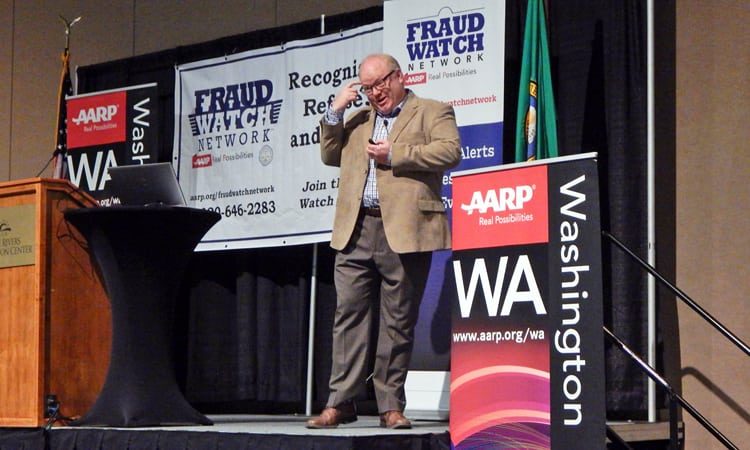
Home » Cyber crime against elderly is on the rise
Cyber crime against elderly is on the rise

December 20, 2015
[blockquote quote="The AARP has a free Fraud Watch Network, aarp.org/fraudwatchnetwork; or call toll free, 877-908-3360. You do not have to be a member of AARP to use it or to sign up for the Watchdog Alerts." align="right" max_width="300px"]Computers, smart phones, email, free Wi-Fi and social media sites make keeping in touch with family and friends as simple as a few clicks. They also enable us to do online shopping and conduct business from anywhere at any time. But, unless you take precautions, thieves hack into those computers, tablets and cell phone and gain access to personal, credit card and even banking information.
A new survey of Washington web surfers done for the AARP shows the freedom and convenience of wireless access may come at a cost. Nearly half of Washington’s internet users failed a quiz about online and wireless safety, while many admit to engaging in activity on their mobile devices that could put them squarely in the sights of hackers hoping to steal their personal information said Doug Shadel, AARP’s Washington state director.
Shadel spoke to about 200 seniors and Baby Boomers at a Cyber Safety workshop sponsored by the AARP, the State Attorney General’s office, Microsoft and the Federal Trade Commission held in early October at the Three Rivers Convention Center. The AARP report, “Shady Signals,” shows the majority of Washington adults — 73 percent — access the internet every day and a quarter of those surveyed said they use free Wi-Fi once a week or more. “The availability of free Wi-Fi at just about every coffee shop, hotel or public gathering place offers limitless surfing possibilities for online users on-the-go,” Shadel said. “But we’re often trading our own data security for that convenience.”
Tina Kondo, assistant regional director of the Federal Trade Commission, the nation’s data and privacy security agency, discussed some of the scams thieves use to get your personal information.
“If you look crime statistics, you’ll see that in Washington alone there have been reports of millions and millions of dollars being lost in the category of “age 50 and older” adults. Cyber criminals tend to prey on vulnerable populations and they consider older adults as being easily duped,” she said.
One of the most popular scams often is the imposter scam. Someone contacts you either by phone or email and pretends to be either a friend or relative in trouble and needing money.
If that happens to you, take the precaution of calling that friend or relative, Kondo said.“They’ll often answer the phone and be perfectly fine,” she said. “Or call another relative who would know if their son, daughter or whomever is out of the country and in trouble.”
Another imposter scam is someone who calls and says they are a contest or lottery representative and you’re eligible for a cash prize — but only if you send a processing fee. “Sometimes they’ll impersonate someone from your bank, utility company or the government and say there’s a problem with your account and they need you to straighten it out. And by the way, in order to do that they need your credit card information, your social security number and all sorts of personal information,” Kondo said. Kondo said the scammers take that information and use it to commit identify theft, emptying victims’ bank accounts and running up large bills for goods and services. “It could take years to straighten it out, if ever,” she said.
Damien Vaught and Dominick Crispo, both of Microsoft, enlightened the audience about tech support scams. Scammers will contact someone via the phone or email, and say there is something wrong with their computer. They tell the victim they can fix it remotely — if you just give them your password. “Do it and you might as well have just handed them every piece of personal information on that computer or device,” said Vaught. Vaught said 3.5 million Americans are victims of tech support scams each year, costing victims about $1.5 billion. It’s important for consumers to be proactive and take precautions to keep their information safe and scammers at bay. If you are a victim, immediately change your passwords, contact your bank and close any affected accounts. Always regularly review all credit card and bank statements and report discrepancies to your bank.
State Attorney General Bob Ferguson said the best way to keep yourself and your personal data safe is to be aware and vigilant.
“People are worried and they should be. Ghosts and goblins are not real but people who prey on others are real,” Ferguson said. “When it comes to scams, prevention it the best protection for consumers. As technology changes, scam artists are constantly finding new ways to conduct cybercrime.”
To protect yourself, here are some tips:
- Change your passwords frequently, at least once every three months. Use at least 10 characters and mix letters, numbers and special characters. Don’t use your name, birthdate or common words.
- Don’t use the same password for many or all of your accounts. Keep passwords in a secure place.
- Keep your anti-virus software up-to-date.
- Even if you don’t bank online, set up online access to bank accounts, so they can be frequently monitored.
- Set up a password on your smart phone, tablet and computers. If lost or stolen no one can access the information stored on them.
There are many websites available with information on spotting scams and how to protect you. The AARP has a free Fraud Watch Network, aarp.org/fraudwatchnetwork; or call toll free, 877-908-3360. You do not have to be a member of AARP to use it or to sign up for the Watchdog Alerts, Shadel said.
Local News
KEYWORDS november 2015





